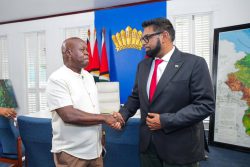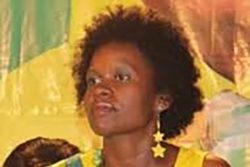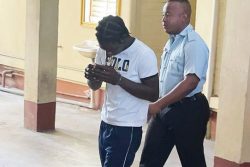By Charlene Wilkinson &
Kencil Banwarie
University of Guyana
Department of Language & Cultural Studies Faculty of Education &
the Humanities
In January of this year, a landmark conference in Jamaica concluded with the presentation to members of the public of the final draft of The Charter on Language Policy and Language Rights in the Creole Speaking Caribbean. Participants at this conference — linguists, educators and policy makers — from fifteen Caribbean States, the United States, the United Kingdom and France met to finalize this document which had its inception in the work of Caribbean linguists begun more than five decades earlier. Current Vice Chancellor of the University of Guyana, Lawrence Carrington, world-renowned linguist, was a keynote speaker at the conference. Two Guyanese lecturers from the University of Guyana, Kencil Banwarie and Charlene Wilkinson were also participants and proud signatories to the Charter along with the other participants. They returned home to introduce it to their peers in the Faculty of Education and the Humanities with the expectation that the University would appreciate the strategic advantage of this historic document and recognise its leadership role in the re-visioning of Guyana’s language policy.
The Charter is built on the foundations of previously established Human Rights treaties: The Charter of the United Nations—The Universal Declaration of Human Rights (1948); the International Covenant on Civil and Political Rights of 1966; and the American Convention on Human Rights of 1969. From the point of view of education, it is a promising beginning to the formulation of a response to the challenges of teaching in the Caribbean because it recognizes the Caribbean Creoles as ‘territorial languages, separate from the European languages from which they derive their vocabulary’.
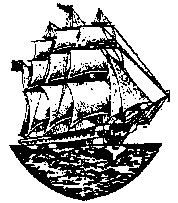 What are the implications of having a Charter on language policy and language rights for language education in Guyana?
What are the implications of having a Charter on language policy and language rights for language education in Guyana?
Although there is, in some quarters, an increasing sense of ownership that suggests a growing pride in the use of Guyanese Creole (Creolese), there is a basic assumption in the society at large that everyone ought to speak English. The idea that an educated person might be able to use Creolese to express intellectual concepts and important ideas still is, generally, an unthinkable thought. In fact, a person who does not master English is often derided for aspiring to or accepting positions in the leadership hierarchies of Guyanese society. They often become targets for people who judge their intellectual capacity by their ability to use English. Such privileging of English speech and de-valuing of Creole speech is a consequence of the inheritance from the British which linguists call the ‘English Mother Tongue Tradition’. With respect to language teaching, what this tradition translates to in the ex-British territories of the Caribbean is a notion that learning occurs in a ‘fixed sequence leading to an ideal, arbitrarily defined competence’ which is modelled in books written by speakers of English.
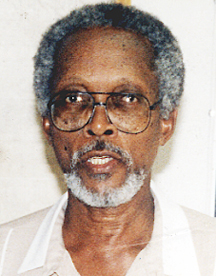
The reported practice in schools of principals forbidding children to speak Creolese and the incontestable evidence that many children and adults feel ashamed because they cannot speak English properly are two of the psychological consequences of this tradition. In general, there is a ‘dumbing down’ of Creole speakers because of the perception that ‘good’ language teachers always speak good English and that teaching is a process of altering natural (Creolese) speech and replacing it with the sounds and syntax of English. Nowhere in the Guyanese education system is there the opportunity for students to develop Creolese in the same way that a French student or a German student would develop French or German.
Language assessment procedures in schools are quite firmly established in a curriculum that renders Creolese both invisible (unwritten) and illegitimate. When students fail to produce good English speech or writing or when they show weaknesses in the comprehension of English, this is usually attributed either to their lack of literacy skills, lack of intelligence, the incompetence of their teachers, or other social, psychological, and even economic problems.
The resulting poor grades, lowered expectations, lack of appreciation for teachers’ efforts, and political fervour about creating social and economic equity in the society are the result of a meritocracy based on English competence reproduced over and over again in the education system. The personal and social dimensions of experience, and the innate cognitive capacities of students which find expression in the varieties of Creole students speak have no valid place in education. An interesting point to note is the Ministry of Education’s introduction of a policy of remedial English classes for students who underperform in the subject. It would be worthwhile to check on how students are deemed eligible for remedial classes. Is it just because they have low grades? Is any consideration given to the influence of the first language on the students’ learning of English? Are remedial classes truly remedial where they seek to fill in the gaps or “correct” Creolese?
What the Charter makes possible is ‘a truly regional process’ for validating the Creole languages across the Caribbean through the collaboration of governments, the exchange of skilled persons, the collective reform of curricula and the creation of teaching materials. Indeed, the reality that these languages are not the creation of deficient and inferior subjects of European Imperial rule, but of resilient makers of history in response to their new experience still has to be embraced even by the Creole speakers themselves. This public awareness and confidence would be more effectively achieved through a regional process.
Statistical evidence indicates that the challenges of English language learning faced by students are common to the entire ex-British Caribbean. In a survey conducted during the 1990’s, a comparison of the performance in English examinations by fifth formers from the Caribbean and fifth formers from England demonstrated that, in spite of comparable high rates of school attendance, the English proficiency of Caribbean students was far below that of native English-speaking students of the same age group. Linguist and educator, Dennis Craig, a former Vice Chancellor of the University of Guyana, attributed this paradox to the Creole-influenced vernacular situation of the majority of Caribbean children. Furthermore, his observations of language teaching practices in schools led him to make three significant pronouncements about language education:
‘In nursery and primary education, the fact that many children can communicate only in Creole is hardly reflected in a critical area such as the teaching of reading.
There is nothing to indicate, in most cases in schools, that English has the status of a second language for most Caribbean children.
The education of teachers is usually not designed to give them the necessary linguistic understanding of both English and Creole—an understanding which they need in order to function efficaciously in CIV [Creole influenced Vernacular] situations.’
It is now nearly sixty years since the 1953 United Nations’ stated position about the practical value of teaching literacy in mother tongue, and more than a decade since Craig published his text for teachers, Teaching Language and Literacy: Policies and Procedures for Vernacular Situations’ (2000). [quoted from above] Craig’s text heralds a significant shift in perspective about the use of language and about language teaching in societies where Creoles are territorial languages. Importantly, Cyril Potter College of Education (CPCE) has embarked on creating a Linguistics module for use in its Associate Degree programme which began this year. Designed by Kencil Banwarie and Dr. Victorine Solomon, such a module is a step in the right direction in not only raising awareness about our unique linguistic situation in Guyana, but will equip teachers with the right knowledge as they encounter sometimes seemingly complex linguistic scenarios in their classrooms.
This is what the charter says, in summary, about education in schools:
“Education must help to foster the capacity for linguistic and cultural self-expression of the language communities of the territory where it is provided.
Education must help to maintain and develop the languages spoken by the language communities of the territory where it is provided.
Initial instruction in one’s first language is crucial as it enhances conceptual development, language acquisition and development, learning in general, and education of the child.
Everyone has the following rights:
–to at least initial instruction and literacy in their first language;
–to learn the territorial languages of the territory in which he/she resides;
–to learn any other language.
All language communities are entitled to have at their disposal all the human and material resources necessary to ensure that their language is present to the extent they desire at all levels of education within their territory.”
Guyanese linguist, Hubert Devonish, Coordinator of the Jamaica Language Unit at Mona, chaired the Conference. He pointed out that three major activities were envisioned: (a) A Regional Council of Language Policy and Rights would be established; (b) Governments, the corporate sector and civil society groups in the various territories would adopt the Charter; and (c) Caribbean Creole Day would be launched. October 28th has now been designated for the observance of that day.
The Guyanese Ministry of Education mission ‘to eliminate illiteracy, to modernize education and to strengthen tolerance’ now certainly appears to be more clearly in sight. It would be interesting to find out, in this election season, which of our competing political parties would be willing to embrace a policy of linguistic democracy which truly validates the voices of all our citizens, as they make promises to lead us into full participatory democracy.


